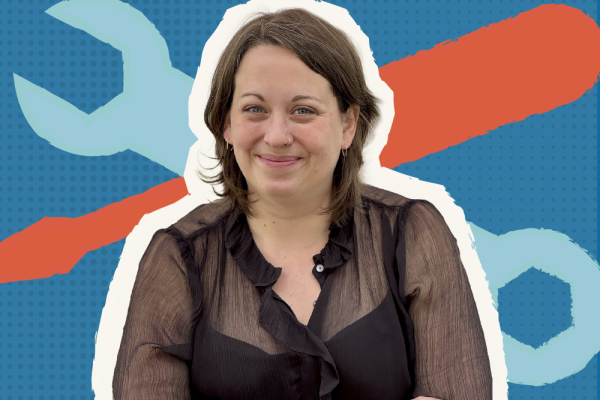I’m a chronic overthinker who tends to dwell on the “what ifs” of life rather than the “what is.” So writer/director Celine Song’s beautifully restrained film Past Lives made me feel uncomfortably seen. The film isn’t a multiverse story; it doesn’t present an infinite amount of intertwined, parallel worlds like Oscar-winner Everything Everywhere All at Once or this year’s Spider-Man: Across the Spider-Verse, but it does explore similar themes, pushing audience members to ask themselves, “What would my life have been like if I had made different choices?” Past Lives is a poignant exploration of both the burden and grace available to us as creatures of free will who are bound to the finality of our choices.
The film, now in theaters nationwide, tells the story of Nora (Greta Lee) and Hae Sung (Teo Yoo), two childhood friends who drift apart when Nora, at the age of 12, emigrates from South Korea to Canada and later to the U.S. The two reconnect as young adults years later via Skype and Facebook. As the two chat across continents, it’s evident that both might want to be more to each other than just friends, yet neither of them make a move.
More years pass before Nora and Hae Sung interact again, this time in person when Hae Sung goes to visit Nora in New York. But at this stage, their worlds are no longer full of possibility. Both are in their mid-30s, and Nora is a successful playwright and married to fellow writer Arthur (John Magaro), while Hae Sung is an engineer in Korea. Nora and Hae Sung explore the city and Arthur, understandably nervous, jokes to her, “What a good story this is. Childhood sweethearts who reconnect 20 years later only to realize they were meant for each other. In the story I would be the evil white American husband standing in the way of destiny.”
The concern is warranted. Central to the film is the idea of in-yun, Korean for “providence” or “fate.” If two people have in-yun, it means that their interactions are never random. Their present-day relationship is the product of countless interactions that the two may have had in their past lives. In other words, no matter how much time or distance has passed, the two are destined to be together.
In slight contrast to the concept of free will, where characters make choices as they see fit, Celine Song describes in-yun as something a little more passive. “It’s easy to think about fate or destiny as something you go get, sometimes you run toward,” she says, “But the truth is, in Eastern philosophy, where in-yun comes from, it is something that comes to you, and you cannot stop it. It’s something that you have to learn how to accept.” As Hae Sung and Nora explore the city, there’s a question of whether they have been united by in-yun; even though both have built their lives without thinking of the other for so long, is there a chance they can be together?
The opening sequence cleverly foreshadows these questions. In the scene, Nora, Arthur, and Hae Sung sit together in a bar. We can’t hear what they’re saying, but we hear the voices of passerbyers speculating about the relationship between the three of them: Are the white guy and Asian woman a couple? Or the other way around? Or are they all just old friends? When, later, we revisit this scene in real time, we know exactly the relationship between the trio.
Yet Past Lives quickly moves on from the “will they or won’t they” trope, in favor of a deeper meditation on the finality of one’s choices and what it looks like to allow grace for those choices. Both Hae Sung and Arthur display a refreshing amount of kindness toward each other, a rare dynamic in cinematic love triangles. “I didn’t know that liking your husband would hurt this much,” Hae Sung tells Nora, while Arthur shares, “The guy flew 13 hours to be here. I’m not going to tell you that you can’t see him or something.”
Nora and Hae Sung will never know how their lives would have ended up had she never left Korea. Past Lives recognizes that we are finite beings, bound by time and space, and as a result, we will always leave stones unturned and dreams unfulfilled. We may always feel as though we could have made a better decision or acted differently in a given scenario. This is both the burden and blessing of having free will and yet also not being able to see all possibilities. For Nora and Hae Sung, there’s both frustration and sadness as the two wonder whether their active choices got in the way of fate and a reality where the two may have ended up together. As writer and journalist Curtis Yee wrote in his review of the film Ride My Car, “So much of grief is about mourning things that were unfinished.”
I resonate with the tension of having to make decisions with limited perspective and not wanting to make the “wrong one.” And yet, I believe the Christian faith leaves room for the idea of both the “passive” nature of in-yun and the “active” nature of free will. There’s hope that no matter how much it seems that evil reigns supreme in the world, it is a sure thing that every tear will be wiped away — that “[d]eath will be no more, and mourning and crying and pain will be no more” (Revelation 21:4). In the face of fear and uncertainty, Jesus offers grace.
Past Lives takes on big questions about the impact of our choices and the nature of destiny and free will. It doesn’t offer any concrete answers but it does model how we should treat each other amid the uncertainty. As the film ended, I found myself thinking yet again about the film’s thematic companion, Everything Everywhere All At Once. “The only thing I do know is that we have to be kind,” says the dimension-hopping Waymond. “Please, be kind. Especially when we don’t know what’s going on.”
Got something to say about what you're reading? We value your feedback!







